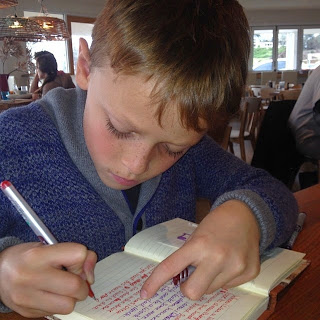Looking for Brave Writers in 2020
It is natural for teachers to want students writers to make progress. Unfortunately, it occasionally leads them to wrest control of writing away from students. As a result the methods used in some classrooms to teach writing convince the emerging writer that any control over writing lies entirely with the adult teaching it. The teacher latches onto controlling topics like a bulldog latches onto a bone. This need to control has it origin in their own writing history. Actions are based on limited knowledge of what it means to be a writer. The teaching over emphasises the surface features of a text and is based on a deficit model of writing. It's primarily about the writing, not the writer. The writing is there to be fixed, rather than developed. Such approaches never encourage brave actions on the part of student writers.
Every time I work with young writers I take the opportunity to discuss the importance of all of us being brave writers. -Writers who are fearless. Writers unafraid of words and ideas. Writers prepared to experiment and explore our thoughts and ideas. We celebrate problems solved and discoveries made in the course of our writing. I share my own writing life, revealing my thinking. If I'm brave, it gives these less experienced writers the confidence to move closer to the edge with their own writing.
Being brave as a student writer means using the word 'fettuccine' rather than 'pasta' because that accurately describes what you were eating. It means Victoria, a Grade 1 writer wanting to write 'aquarium' even though she is initially unsure of how to spell it, yet brave enough to commit her chosen word to paper. We celebrate these brave deeds with gusto! This will ensure more brave writers will emerge in the days ahead.
If we, as teachers of writing encourage students to choose their own topics and genres, identify their audiences and make decisions about what messages they wish to convey, we foster the growth of self confidence -an important ingredient in the emergence of brave and fearless writers.
Brave young writers need brave teachers to support them. -Teachers who joyfully share their own reading and writing lives. I am pleased to report I see a growing army of brave teachers when I visit schools. Teachers are stepping up to the challenge and joining their students on this important learning journey. Their actions are having an impact.
Those teachers taking a leap of faith and taking up the challenge of writing alongside their students in 2020 -maybe starting their writer's notebook are definitely risk takers and deserve support and encouragement. Their collected notebook entries and writing discoveries will provide first hand knowledge of the challenges student writers face every day.
If we want to impact the quality of the notebook entries our students are presenting, we must apply purpose to our own notebook, not theirs. If the notebook becomes a ‘teacher’ thing, it is divested of power and influence. Avoid turning the writer’s notebook into something that might be perceived as a ‘workbook.' Encourage student ownership. Strongly resist any urge to takeover!
Be brave and watch the changes it brings to your teaching of writing.
Every time I work with young writers I take the opportunity to discuss the importance of all of us being brave writers. -Writers who are fearless. Writers unafraid of words and ideas. Writers prepared to experiment and explore our thoughts and ideas. We celebrate problems solved and discoveries made in the course of our writing. I share my own writing life, revealing my thinking. If I'm brave, it gives these less experienced writers the confidence to move closer to the edge with their own writing.
Being brave as a student writer means using the word 'fettuccine' rather than 'pasta' because that accurately describes what you were eating. It means Victoria, a Grade 1 writer wanting to write 'aquarium' even though she is initially unsure of how to spell it, yet brave enough to commit her chosen word to paper. We celebrate these brave deeds with gusto! This will ensure more brave writers will emerge in the days ahead.
If we, as teachers of writing encourage students to choose their own topics and genres, identify their audiences and make decisions about what messages they wish to convey, we foster the growth of self confidence -an important ingredient in the emergence of brave and fearless writers.
Brave young writers need brave teachers to support them. -Teachers who joyfully share their own reading and writing lives. I am pleased to report I see a growing army of brave teachers when I visit schools. Teachers are stepping up to the challenge and joining their students on this important learning journey. Their actions are having an impact.
Those teachers taking a leap of faith and taking up the challenge of writing alongside their students in 2020 -maybe starting their writer's notebook are definitely risk takers and deserve support and encouragement. Their collected notebook entries and writing discoveries will provide first hand knowledge of the challenges student writers face every day.
If we want to impact the quality of the notebook entries our students are presenting, we must apply purpose to our own notebook, not theirs. If the notebook becomes a ‘teacher’ thing, it is divested of power and influence. Avoid turning the writer’s notebook into something that might be perceived as a ‘workbook.' Encourage student ownership. Strongly resist any urge to takeover!









Comments
Post a Comment